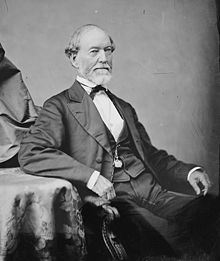James W. Flanagan
| James Winright Flanagan | |
|---|---|
 |
|
|
United States Senator from Texas |
|
|
In office March 30, 1870 – March 4, 1875 |
|
| Preceded by | Louis Wigfall |
| Succeeded by | Samuel B. Maxey |
| 11th Lieutenant Governor of Texas | |
|
In office 1869–1870 |
|
| Governor | Vacant |
| Preceded by | George W. Jones |
| Succeeded by | Donald Campbell |
| Member of the Texas Senate from District 9 | |
|
In office 1855–1857 |
|
| Preceded by | David Gage |
| Succeeded by | Malcolm D. Graham |
| Member of the Texas House of Representatives | |
|
In office 1851-1852 |
|
| Personal details | |
| Born |
September 5, 1805 Gordonsville, Virginia |
| Died | September 28, 1887 (aged 82) Longview, Texas |
| Political party | Republican |
James Winright Flanagan (September 5, 1805 – September 28, 1887) was an American merchant, lawyer, and farmer from Henderson, Texas. He served as the eleventh Lieutenant Governor of Texas in 1869 and 1870, and then represented Texas in the United States Senate from 1870 to 1875.
James was born to Charles and Elizabeth (Saunders) Flanagan in Albemarle County near Gordonsville, Virginia. Before his tenth birthday, the family moved to Boonesboro, Kentucky. As a young man he moved to Cloverport, Kentucky, on the Ohio River and became a prosperous merchant. He also read law and was admitted to the Kentucky bar in 1825. He married Polly Moorman in 1826 and the couple had several children before moving to Henderson, Texas, in 1844.
Flanagan established himself in Henderson by opening a store. He bought a farm, speculated in land, and practiced law. Politically, he was a Whig and an active supporter of Sam Houston. He later became a moderate Republican. Flanagan served in the Texas House of Representatives (1851–1852) and the Texas State Senate (1855–1858).
When the Civil War came to Texas, Flanagan was a Unionist, but he withdrew to his farm and lived quietly. He returned to active politics during the Reconstruction. He served as a delegate to both Constitutional Conventions. The first, in 1866, produced a state constitution that was rejected by the Radical Republicans in the U.S. Congress. The second, in 1868–1869, was successful.
...
Wikipedia
